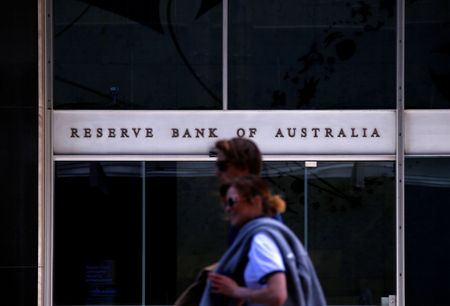 1
1 1
1

By Wayne Cole
SYDNEY (Reuters) -Australia’s top central banker is confident the economy will recover strongly from any weakness caused by a recent surge in coronavirus cases, but sees risks in moving too early to raise interest rates.
Speaking on Friday before a parliamentary economics committee, Reserve Bank of Australia (RBA) Governor Philip Lowe said there was a chance to get unemployment under 4% for the first time in 50 years and it was worth risking a period of higher inflation.
“Over the period ahead we have the opportunity to secure a lower rate of unemployment than was thought possible just a short while ago,” said Lowe. “Moving too early could put this at risk.”
The economy hit a speed bump in January as the rapid spread of the Omicron variant curbed consumer mobility, though spending has since recovered as cases levelled off.
The labour market remains tight with unemployment at a 13-year low of 4.2% and vacancies at record highs.
Wage growth has picked up somewhat to 2.2% but is still running at less than half the pace of the United States or Britain, and policy makers would prefer to see it up at 3.0% or more before withdrawing stimulus.
Lowe has said a rate rise could come later this year should the economy continue to beat expectations, though investors are wagering on a move as early as June given that inflationary pressures were building across the globe.
Markets are fully priced for the 0.1% cash rate to rise to 0.25% in June and to reach at least 1.0% by Christmas.
Lowe on Friday said it was not yet certain that core inflation would remain in its 2%-3% target band, having been below the band for the past seven years. Consumer prices are currently rising at 3.5%, while core inflation is at 2.6%.
“In these circumstances, the Board is prepared to be patient,” Lowe said. “The stronger the economy and the more upward pressure on prices and wages, the stronger will be the case for an increase in interest rates.”
(Reporting by Wayne Cole; Editing by Leslie Adler and Stephen Coates)